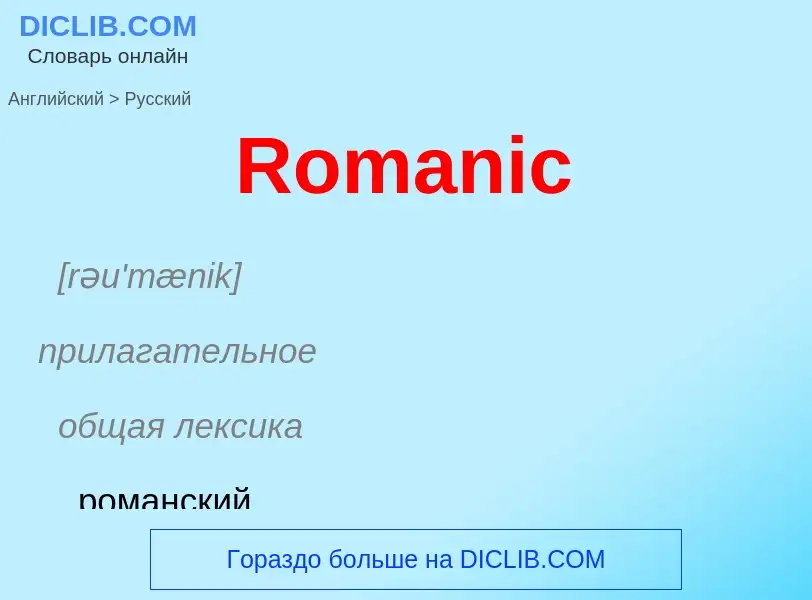Traducción y análisis de palabras por inteligencia artificial ChatGPT
En esta página puede obtener un análisis detallado de una palabra o frase, producido utilizando la mejor tecnología de inteligencia artificial hasta la fecha:
- cómo se usa la palabra
- frecuencia de uso
- se utiliza con más frecuencia en el habla oral o escrita
- opciones de traducción
- ejemplos de uso (varias frases con traducción)
- etimología
Romanic - traducción al ruso
[rəu'mænik]
прилагательное
общая лексика
романский
существительное
[rəu'mænik]
общая лексика
романские языки
[ri:təurəu'mænik]
синоним
Wikipedia

The Romance languages, sometimes referred to as Latin languages or Neo-Latin languages, are various modern languages that evolved from Late Latin and its spoken form, often called Vulgar Latin. They are the only extant subgroup of the Italic languages in the Indo-European language family.
The five most widely spoken Romance languages by number of native speakers are Spanish (489 million), Portuguese (283 million), French (77 million), Italian (67 million) and Romanian (24 million), which are all national languages of their respective countries of origin. By most measures, Sardinian and Italian are the least divergent languages from Latin, while French has changed the most. However, all Romance languages are closer to each other than to classical Latin.
There are more than 900 million native speakers of Romance languages found worldwide, mainly in the Americas, Europe, and parts of Africa. The major Romance languages also have many non-native speakers and are in widespread use as linguae francae.
Because it is difficult to assign rigid categories to phenomena such as languages which exist on a continuum, estimates of the number of modern Romance languages vary. For example, Dalby lists 23, based on the criterion of mutual intelligibility. The following includes those and additional current, living languages, and one extinct language, Dalmatian:
- Ibero-Romance: Portuguese, Galician, Asturleonese/Mirandese, Spanish, Aragonese, Ladino;
- Occitano-Romance: Catalan/Valencian, Occitan (lenga d'oc), Gascon (sometimes not considered part of Occitan);
- Gallo-Romance: French/Oïl languages, Franco-Provençal (Arpitan);
- Rhaeto-Romance: Romansh, Ladin, Friulian;
- Gallo-Italic: Piedmontese, Ligurian, Lombard, Emilian, Romagnol;
- Venetan (classification disputed);
- Italo-Dalmatian: Italian (Tuscan, Corsican, Sassarese, Central Italian), Sicilian/Extreme Southern Italian, Neapolitan/Southern Italian, Dalmatian (extinct in 1898), Istriot;
- Eastern Romance: Romanian, Aromanian, Megleno-Romanian, Istro-Romanian;
- Sardinian.









![Bilingual road sign (Italian and Friulian) in [[Friuli-Venezia Giulia]] Bilingual road sign (Italian and Friulian) in [[Friuli-Venezia Giulia]]](https://commons.wikimedia.org/wiki/Special:FilePath/Furlan Venčon.jpg?width=200)

